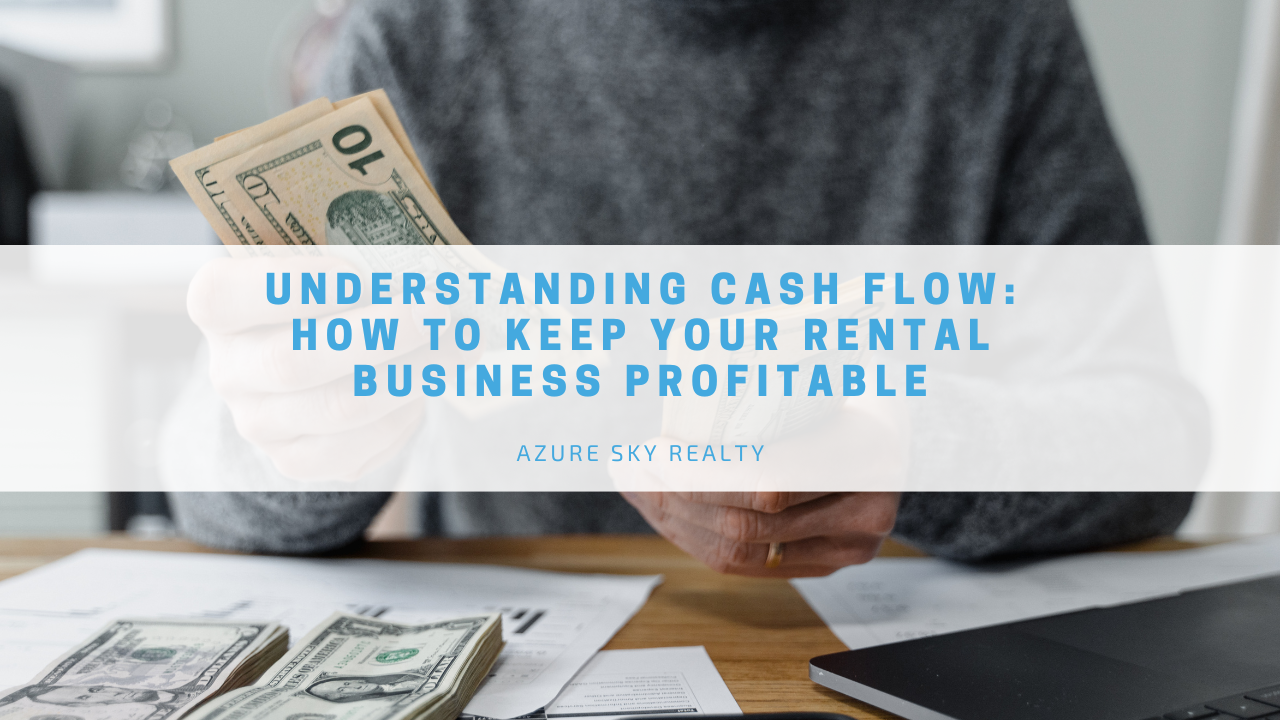Understanding Cash Flow: How to Keep Your Rental Business Profitable
Key Takeaways
1. Cash Flow Determines Profitability: Cash flow is the single most important factor in evaluating a rental property's performance—positive cash flow means profit, negative cash flow means loss.
2. Accurate Estimates Are Critical: To calculate cash flow correctly, you must realistically assess both rental income and all operating expenses—including vacancies, repairs, and property management fees.
3. Smart Management Maximizes ROI: Choosing the right property, minimizing costs, and managing it professionally are key to long-term success—and that’s where Azure Sky Realty can help.
What separates a winning investment property from a financial headache? The answer often comes down to one key factor: cash flow.
At Azure Sky Realty, we help investors cut through the noise and focus on the numbers that matter. Cash flow is the clearest indicator of whether a rental property is truly performing or just draining your resources.
In simple terms, cash flow measures how much income your property generates after all expenses are paid. A positive cash flow means your investment is paying off each month. A negative one? That’s a sign your property may be costing you more than it’s worth.
As a landlord or investor, your goal should always be to generate steady, positive cash flow.
So what goes into that calculation, and how can you use it to evaluate a potential property? Keep reading to learn more.
What Goes Into Calculating Cash Flow
Know the Expected Rental Income
You can do this by using the property’s fair market value. If the property is listed for, say, $150,000, then use the 1% Rule to determine the expected monthly rent. This would mean the expected rent to get from the property would be around $1,500.
Another way to do this is by conducting a comparative market analysis. Look for comparable properties and see how much they are renting for. The units, however, must be ‘comparable’ for an accurate analysis.
They must share similar features, such as square footage, location, amenities, and even general appeal.
Know the Expected Running Expenses
To determine an investment’s cash flow, you’ll also need to factor in the operating expenses. These are the costs of running the property, such as repairs and maintenance, mortgage payments, property taxes, landlord insurance, and property management costs.
Others include utility costs, HOA fees, and the cost of upgrading the unit.
Usually, these will account for about half the monthly rental income. So, suppose you have projected the property to generate $1,200 a month, then expect the running costs to account for around $600.
Estimate the Repair and Rehab Costs
If buying a property that requires repairs or updating, do your due diligence first. Hire a local property manager and have them provide you with several different quotes from different contractors for comparison.
Also, have them inspect the property for legal compliance in regards to the local safety, health, and building codes. Remember, as a landlord, you must rent out a habitable unit that meets all the local codes.
Now, analyze the cost of bringing the property up to code. Is the repair and rehab cost going to cost an arm and a leg? If so, weigh your options. However, if the work only requires a handyman, then the investment may be worthwhile.
How to Determine Cash Flow
As already mentioned, cash flow is the difference between the rental income and the running costs. When calculating the cash flow of a rental property, don’t make the mistake of overestimating income and underestimating expenses.
To determine cash flow, the following are some of the things you’ll want to include in your analysis.
Gross annual rental income: This refers to all money earned from renting out a property. It includes rent, late rent fees, and withheld security deposits.
Vacancy costs: Your rental property won’t always be occupied. Vacancy costs refer to the financial losses incurred when the property isn’t occupied by a renter.
Property management fees: This is the expense incurred when using property management services to run the day-to-day operations of the property. It ranges between 8- and 12% of the monthly rent.
Repair and maintenance costs: Now and then, you’ll need to fix issues at the property. For example, repair a leaky faucet.
Other expenses include property taxes, HOA fees, pest control, snow removal, and landscaping.
Net annual cash flow: This is the amount you get after subtracting all operating expenses from the effective gross rental income.
Effective gross rental income: This is the difference between the gross annual rent and the vacancy costs.
Now, to calculate cash flow on a rental property, you’ll need to subtract the expected expenses from the rental income. Cash Flow = Rental Income – Running Costs
Suppose that the monthly rental income amounts to $2,500. This includes income from sources such as the monthly rent collected from tenants, pet fees, parking fees, and late rent fees.
Also, suppose that the running expenses amount to $1,500. This includes expenses such as landlord insurance, mortgage payment, maintenance and repair, utilities, and property taxes.
The expected cash flow from that property would be $2,500-$1,500=$1,000 per month. In this example, the property would generate a cash flow of $1,000 per month after all expenses have been covered.
Conclusion
When it comes to rental investments, cash flow isn’t just important, it’s everything. But generating consistent, positive cash flow doesn’t happen by accident.
It takes smart decisions, careful planning, and ongoing management. That means choosing the right property, keeping expenses under control, placing reliable tenants, and maintaining your investment like a pro.
At Azure Sky Realty, we’re here to make that process easier, and more profitable, for you. Based in College Station, TX, we’re a full-service realty company specializing in property management and leasing. Our team is committed to helping you minimize costs, maximize ROI, and achieve your long-term investment goals.
Ready to take the next step? Get in touch with Azure Sky Realty and let’s build your success together.




